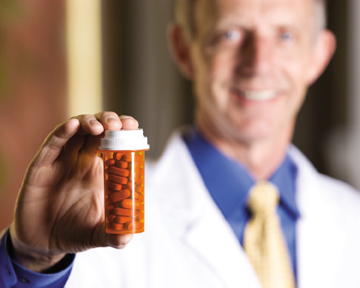HOME
PAST DIGITAL ISSUES
HIV/AIDS HOTLINES
HIV 101
POSITIVE PROFILES
ASO SPOTLIGHT
RECENT ARTICLES
HOW TO PAY FOR HIV TREATMENT AND MEDICATIONS
ADAP CRITERIA AND FORMULARIES
ASO LISTINGS
REVIEW OF HIV MEDICATIONS
2018 HIV/AIDS FUNDRAISING ACTIVITIES & EVENTS
ABOUT HIV POSITIVE! MAGAZINE
LINKS
SUBSCRIBE
CONTACT US
ADVERTISER INFORMATION

The history of HIV treatment is short. It started on March 19, 1987, when the Food And Drug Administration (FDA) approved the first-ever drug designed to combat HIV-Retrovir, more commonly known as AZT.
As the years went by, more HIV drugs were introduced. In late 1995 and 1996 there was a real breakthrough. Scientists discovered that combining three HIV drugs into a treatment "cocktail" could stop HIV in its tracks.
Since then, HIV drugs have gotten better and better: more effective, easier to take, and easier to tolerate. Some of the early drugs, once hailed as lifesavers, have become obsolete. Today, for many people who are newly diagnosed, it is possible to control HIV with just one pill, taken just once a day.
There still is no cure for HIV. The drugs available can keep your HIV from reproducing, but they cannot wipe it out. Once you start taking the drugs, you have to keep taking them for life. If you stop, the virus comes roaring back.
Still, the change is remarkable. HIV is no longer a death sentence. Today, HIV is a chronic manageable disease, similar in many ways to type 1 diabetes (and much easier to manage!) No one lives forever, but most people living with HIV today will probably die of something else.
This issue of HIV Positive! magazine includes a complete list of every medication approved by the FDA for the treatment of HIV. It's in plain English, and we call 'em like we see 'em. We encourage you to read it, and discuss your options with your doctor.
It also includes an important article on when you should start treatment. If you are newly diagnosed, you may not have to start taking HIV drugs for years. You don't want to start too early-but you also don't want to start too late.
But don't fall into the trap of focusing on HIV as if it were the only health issue you need to care about. HIV is only one part of your total health picture!
Here are some suggestions:
Even if you're not on HIV medications yet, you need a doctor right now to monitor your viral load and T-cell count. Even though you may be feeling fine, you should have your viral load tested every 3-4 months, and your T-cell count measured every 3-6 months.
When you do go on medications, make sure you take them faithfully! Today's HIV medicines are much easier to take and much more tolerable than the medications available just a few years ago. But they don't work unless you take them! Missing doses can result in drug resistance. So be sure to take your meds on time, every time. When it comes to HIV medications, you can't afford to miss a dose.
 of several major diseases, including heart disease, diabetes and several kinds of cancer. It can help protect you from osteoporosis by increasing your bone mineral density.
of several major diseases, including heart disease, diabetes and several kinds of cancer. It can help protect you from osteoporosis by increasing your bone mineral density. (Osteoporosis is sometimes a problem for people on long-term anti-HIV treatment.) Exercise is one of the best ways to prevent and reverse lipodystrophy, the changes in body fat distribution that affect some people with HIV. And exercise helps lower both your blood pressure and your cholesterol level. (Elevated cholesterol is a problem for many people on HIV medications.)
What kind of exercise should you do? Ideally, a combination of aerobic exercise, like walking, jogging or bicycling, resistance exercise or weight training, and stretching.
However, almost anything you do will help! Find a sport or activity you enjoy. The key is to keep at it, and the more fun your chosen activity is, the more likely you will!
If you're on  HIV meds-especially if you're on a regimen that includes a protease inhibitor-ask your doctor for a complete cholesterol check, which is also called a "lipid panel." Some HIV medications can raise your LDL ("bad cholesterol") levels along with your triglycerides-another fatty substance in the blood which can contribute to heart disease. If your cholesterol and triglycerides are high, your doctor may prescribe a class of drug called "statins" to help bring them down. In any case, you can help keep your cholesterol under control by learning about nutrition and eating a diet that is low in saturated fats and high in fiber. Exercise also helps keep your cholesterol levels under control.
HIV meds-especially if you're on a regimen that includes a protease inhibitor-ask your doctor for a complete cholesterol check, which is also called a "lipid panel." Some HIV medications can raise your LDL ("bad cholesterol") levels along with your triglycerides-another fatty substance in the blood which can contribute to heart disease. If your cholesterol and triglycerides are high, your doctor may prescribe a class of drug called "statins" to help bring them down. In any case, you can help keep your cholesterol under control by learning about nutrition and eating a diet that is low in saturated fats and high in fiber. Exercise also helps keep your cholesterol levels under control.
Of course, we all know that broccoli is good for you and potato chips are not. But if you really want to be healthy, you need to learn more about nutrition than that-and you need to act on what you've learned.
If you really feel down in the dumps-especially if you have thoughts of suicide-get help from your doctor. Anti-depressant medications can help bring you out of it. So can psychological counseling. Support groups can keep you from feeling all alone. Exercise is also a highly effective anti-depressant.
You can live a long, happy, fantastic life with HIV! But don't take your health for granted. Take good care of your body, and it will take good care of you.
Copyright 2018, Positive Health Publications, Inc.
This magazine is intended to enhance your relationship with your doctor - not replace it! Medical treatments and products should always be discussed with a licensed physician who has experience treating HIV and AIDS!